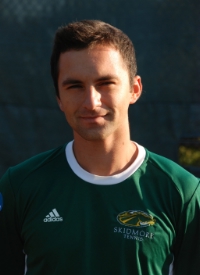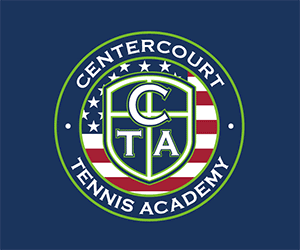Mythbusters: Instant Impressions on the Way Out From a Top Eastern Junior Who Graduated From a D3 School

Skidmore graduate Oliver Loutsenko left Skidmore with three All-American years under his belt, as well as being named Liberty Conference Player of the Year. Not just MVP of his team, but of the entire league. As a junior tennis player, Oliver had the opportunity to go D3 instead of D1. We asked him about that decision and his overall impression of the Division III landscape. I really like his answer to the last question about advice he would give to players looking for a college, especially in Division III.
I’m sure you had opportunities to play Division I tennis coming out of the juniors, why did you decide on Division III?
Oliver Loutsenko: Growing up and planning for college, there was always a huge priority placed on education. While there are a fair amount of good academic D1 schools, I felt like going to a good D3 program that would give me the best opportunity to enjoy my college tennis experience, while making sure I had more than enough time to focus on academics and not missing out on the other things college has to offer.
What are some of the advantages/disadvantages of playing D3?
Loutsenko: As for advantages, playing D3 gives you plenty of time for academics, hanging out with friends, seeing your family, even doing something extracurricular like playing intramural sports such as flag football or indoor soccer. As for disadvantages, if you’re a highly-ranked junior, you may find that it’s not always exciting competition wise, depending on what conference you’re in or what team you’re on. The top of D3 tennis is still very high quality, but sometimes, you’ll feel like the tennis isn’t always the level you’ve been accustomed to in juniors.
Did you have a preference of playing juniors versus college?
Loutsenko: I’d have to say I prefer college. Having constant support from teammates makes it a lot more fun to compete. Also, traveling with your friends and hanging out makes going to matches and tournaments a lot more fun as well.
Was there anything you didn’t expect about your college tennis experience?
Loutsenko: I wouldn’t say there was a whole lot I didn’t expect. There was a lot of practicing, training, tough matches, lengthy road trips, and other things I grew accustomed to in junior tennis. The one thing I will say about D3 tennis is that the sportsmanship is generally at another level from junior tournaments—far less cheating, more gamesmanship, etc. One thing that was a bit difficult to get used to was playing on a team. In juniors, with the exception of a couple tournaments like Zonals and Intersectionals, you play exclusively for yourself (and some people for their parents). Playing on a team is a totally different mindset when you have teammates on adjacent courts who are cheering for you, and at the same time, are relying on you for motivation and support.
What was the highlight of your college tennis career?
Loutsenko: I think it would be appropriate to give two highlights, a team highlight and individual highlight as the fall season is generally considered individual, while the spring is team. My best individual moment was my senior year, winning our regional tournament in both singles and doubles with one of my best friends on the team, in the same day. By far the highlight of my career as a player on the team was beating Williams 5-4 my senior year in my first singles match back from a fractured wrist.
What advice would you give someone going to college as far as choosing between various schools?
Loutsenko: I’d say that anyone going to a D3 school in the northeast should place a high importance of how well they get along with members of the team on their recruiting visit that will be around in the future. Many of the schools are very close to each other in terms of academics and tennis team pedigree, and you’re generally not going to get a genuine feel for whether you’ll like the coaching staff just based off a recruiting visit. In my opinion, whether or not you like the team and how well you get along with them will decide whether you stay at that school for four years. It can make or break your college experience because your teammates will almost definitely be amongst your best friends at school.






